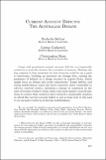Mostrar el registro sencillo del ítem
Current account deficits: the Australian debate
| dc.contributor.author | Belkar, Rochelle | |
| dc.contributor.author | Cockerell, Lynne | |
| dc.contributor.author | Kent, Christopher | |
| dc.coverage.spatial | AUSTRALIA | es_ES |
| dc.date.accessioned | 2019-11-01T00:04:06Z | |
| dc.date.available | 2019-11-01T00:04:06Z | |
| dc.date.issued | 2008 | |
| dc.identifier.isbn | 978-956-7421-30-5 | |
| dc.identifier.uri | https://hdl.handle.net/20.500.12580/3743 | |
| dc.description | Large and persistent current account deficits are frequently raised as a cause for concern for a number of reasons. Perhaps the key concern is that countries in this situation could be on a path to insolvency, building up excessive net foreign debt, raising the prospects of default or a sharp reversal in capital flows, which might force an abrupt and costly adjustment.1 Large deficits and rising indebtedness could also leave countries more vulnerable to adverse external shocks, including a change in sentiment on the part of foreign creditors. Some argue that policymakers should take steps to ensure that countries move toward a sustainable position in which the current account deficit is not so large that it will lead to an excessive build-up in foreign indebtedness. | |
| dc.format | ||
| dc.format.extent | Sección o Parte de un Documento | |
| dc.format.medium | p. 491-535 | |
| dc.language.iso | eng | |
| dc.publisher | Banco Central de Chile | |
| dc.relation.ispartof | Series on Central Banking, Analysis, and Economic Policies, no. 12 | |
| dc.rights | Attribution-NonCommercial-NoDerivs 3.0 Chile | * |
| dc.rights.uri | http://creativecommons.org/licenses/by-nc-nd/3.0/cl/ | * |
| dc.subject | POLÍTICA ECONÓMICA | es_ES |
| dc.subject | DEUDA EXTERNA | es_ES |
| dc.subject | MOVIMIENTOS DE CAPITAL | es_ES |
| dc.title | Current account deficits: the Australian debate | |
| dc.type.doc | Artículo | |
| dc.file.name | BCCh-sbc-v12-p491_535 |


